Bibliometric Analysis of Entrepreneurship Research
VerifiedAdded on 2020/09/17
|17
|5395
|94
AI Summary
This assignment involves a comprehensive review of existing literature on entrepreneurship research. It includes a bibliometric analysis of international impact of business incubators, as well as studies on entrepreneurship during crises, enterprise risk management in SMEs, and the theory of planned behavior in entrepreneurship research. The assignment also covers topics such as economic and political institutions and entry into formal and informal entrepreneurship, marketing and entrepreneurship, use of infrastructures to support innovative entrepreneurship, and robustness of the theory of planned behavior in predicting entrepreneurial intentions and actions.
Contribute Materials
Your contribution can guide someone’s learning journey. Share your
documents today.

ENTREPRENEURSHIP AND
SMALL BUSINESS
MANAGEMENT
SMALL BUSINESS
MANAGEMENT
Secure Best Marks with AI Grader
Need help grading? Try our AI Grader for instant feedback on your assignments.
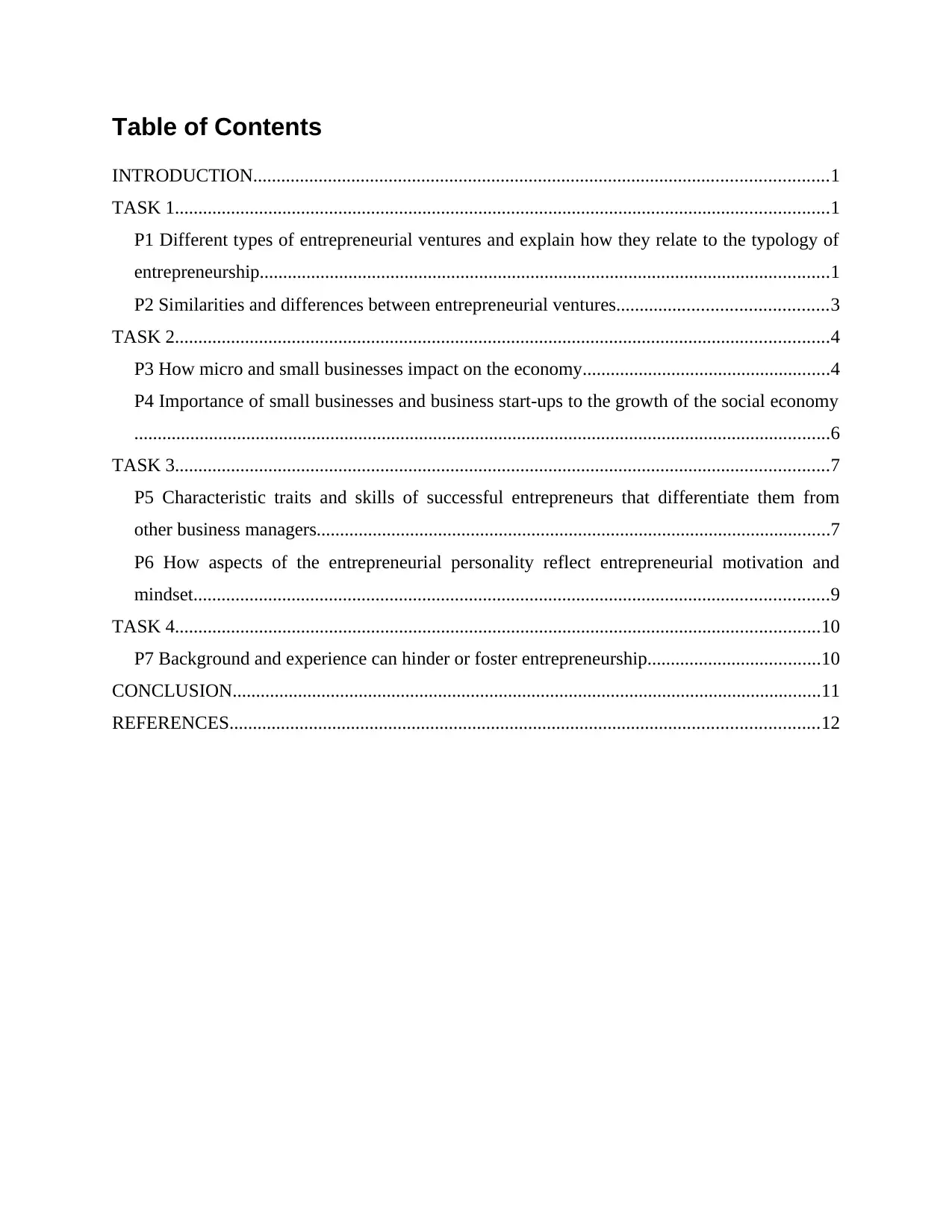
Table of Contents
INTRODUCTION...........................................................................................................................1
TASK 1............................................................................................................................................1
P1 Different types of entrepreneurial ventures and explain how they relate to the typology of
entrepreneurship..........................................................................................................................1
P2 Similarities and differences between entrepreneurial ventures.............................................3
TASK 2............................................................................................................................................4
P3 How micro and small businesses impact on the economy.....................................................4
P4 Importance of small businesses and business start-ups to the growth of the social economy
.....................................................................................................................................................6
TASK 3............................................................................................................................................7
P5 Characteristic traits and skills of successful entrepreneurs that differentiate them from
other business managers..............................................................................................................7
P6 How aspects of the entrepreneurial personality reflect entrepreneurial motivation and
mindset........................................................................................................................................9
TASK 4..........................................................................................................................................10
P7 Background and experience can hinder or foster entrepreneurship.....................................10
CONCLUSION..............................................................................................................................11
REFERENCES..............................................................................................................................12
INTRODUCTION...........................................................................................................................1
TASK 1............................................................................................................................................1
P1 Different types of entrepreneurial ventures and explain how they relate to the typology of
entrepreneurship..........................................................................................................................1
P2 Similarities and differences between entrepreneurial ventures.............................................3
TASK 2............................................................................................................................................4
P3 How micro and small businesses impact on the economy.....................................................4
P4 Importance of small businesses and business start-ups to the growth of the social economy
.....................................................................................................................................................6
TASK 3............................................................................................................................................7
P5 Characteristic traits and skills of successful entrepreneurs that differentiate them from
other business managers..............................................................................................................7
P6 How aspects of the entrepreneurial personality reflect entrepreneurial motivation and
mindset........................................................................................................................................9
TASK 4..........................................................................................................................................10
P7 Background and experience can hinder or foster entrepreneurship.....................................10
CONCLUSION..............................................................................................................................11
REFERENCES..............................................................................................................................12

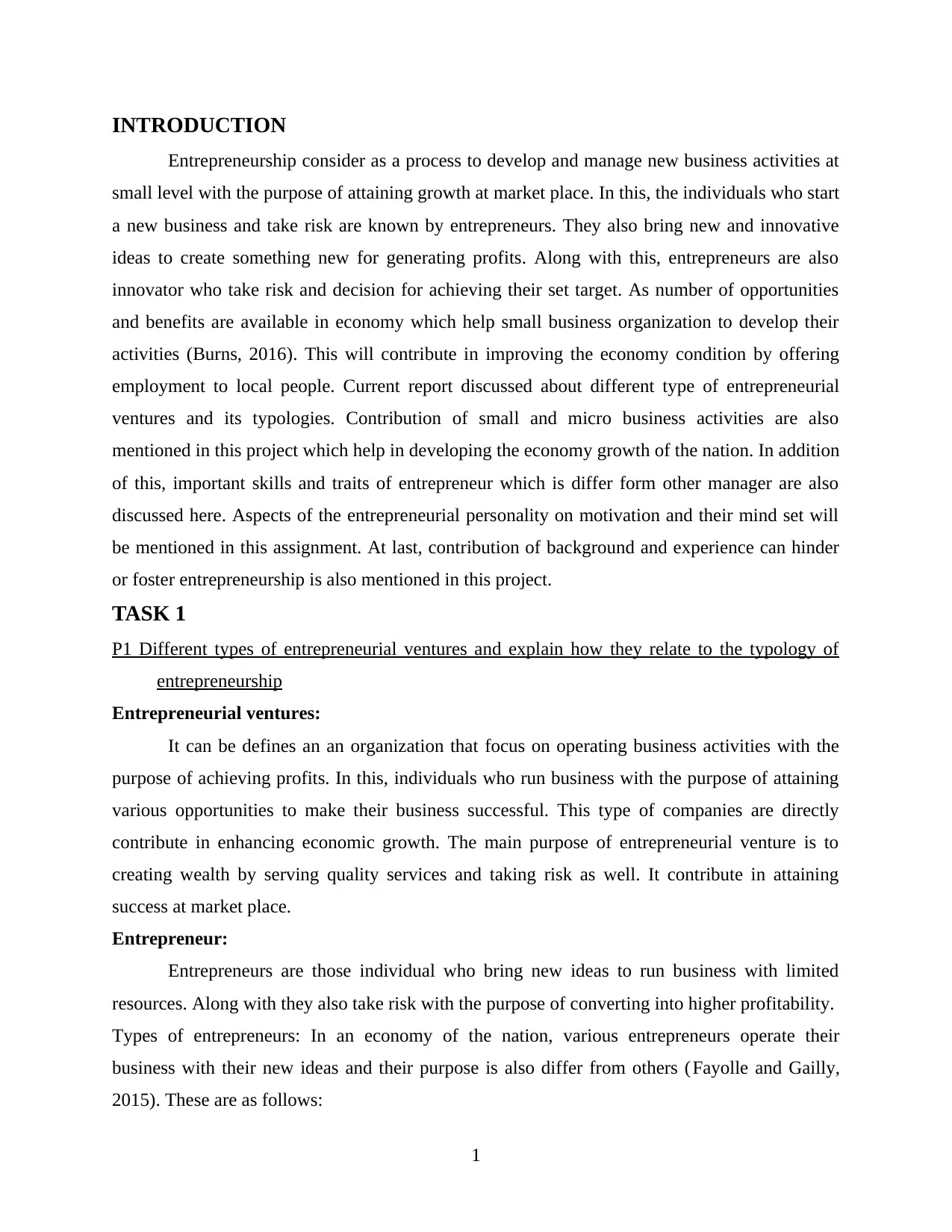
INTRODUCTION
Entrepreneurship consider as a process to develop and manage new business activities at
small level with the purpose of attaining growth at market place. In this, the individuals who start
a new business and take risk are known by entrepreneurs. They also bring new and innovative
ideas to create something new for generating profits. Along with this, entrepreneurs are also
innovator who take risk and decision for achieving their set target. As number of opportunities
and benefits are available in economy which help small business organization to develop their
activities (Burns, 2016). This will contribute in improving the economy condition by offering
employment to local people. Current report discussed about different type of entrepreneurial
ventures and its typologies. Contribution of small and micro business activities are also
mentioned in this project which help in developing the economy growth of the nation. In addition
of this, important skills and traits of entrepreneur which is differ form other manager are also
discussed here. Aspects of the entrepreneurial personality on motivation and their mind set will
be mentioned in this assignment. At last, contribution of background and experience can hinder
or foster entrepreneurship is also mentioned in this project.
TASK 1
P1 Different types of entrepreneurial ventures and explain how they relate to the typology of
entrepreneurship
Entrepreneurial ventures:
It can be defines an an organization that focus on operating business activities with the
purpose of achieving profits. In this, individuals who run business with the purpose of attaining
various opportunities to make their business successful. This type of companies are directly
contribute in enhancing economic growth. The main purpose of entrepreneurial venture is to
creating wealth by serving quality services and taking risk as well. It contribute in attaining
success at market place.
Entrepreneur:
Entrepreneurs are those individual who bring new ideas to run business with limited
resources. Along with they also take risk with the purpose of converting into higher profitability.
Types of entrepreneurs: In an economy of the nation, various entrepreneurs operate their
business with their new ideas and their purpose is also differ from others (Fayolle and Gailly,
2015). These are as follows:
1
Entrepreneurship consider as a process to develop and manage new business activities at
small level with the purpose of attaining growth at market place. In this, the individuals who start
a new business and take risk are known by entrepreneurs. They also bring new and innovative
ideas to create something new for generating profits. Along with this, entrepreneurs are also
innovator who take risk and decision for achieving their set target. As number of opportunities
and benefits are available in economy which help small business organization to develop their
activities (Burns, 2016). This will contribute in improving the economy condition by offering
employment to local people. Current report discussed about different type of entrepreneurial
ventures and its typologies. Contribution of small and micro business activities are also
mentioned in this project which help in developing the economy growth of the nation. In addition
of this, important skills and traits of entrepreneur which is differ form other manager are also
discussed here. Aspects of the entrepreneurial personality on motivation and their mind set will
be mentioned in this assignment. At last, contribution of background and experience can hinder
or foster entrepreneurship is also mentioned in this project.
TASK 1
P1 Different types of entrepreneurial ventures and explain how they relate to the typology of
entrepreneurship
Entrepreneurial ventures:
It can be defines an an organization that focus on operating business activities with the
purpose of achieving profits. In this, individuals who run business with the purpose of attaining
various opportunities to make their business successful. This type of companies are directly
contribute in enhancing economic growth. The main purpose of entrepreneurial venture is to
creating wealth by serving quality services and taking risk as well. It contribute in attaining
success at market place.
Entrepreneur:
Entrepreneurs are those individual who bring new ideas to run business with limited
resources. Along with they also take risk with the purpose of converting into higher profitability.
Types of entrepreneurs: In an economy of the nation, various entrepreneurs operate their
business with their new ideas and their purpose is also differ from others (Fayolle and Gailly,
2015). These are as follows:
1
Secure Best Marks with AI Grader
Need help grading? Try our AI Grader for instant feedback on your assignments.
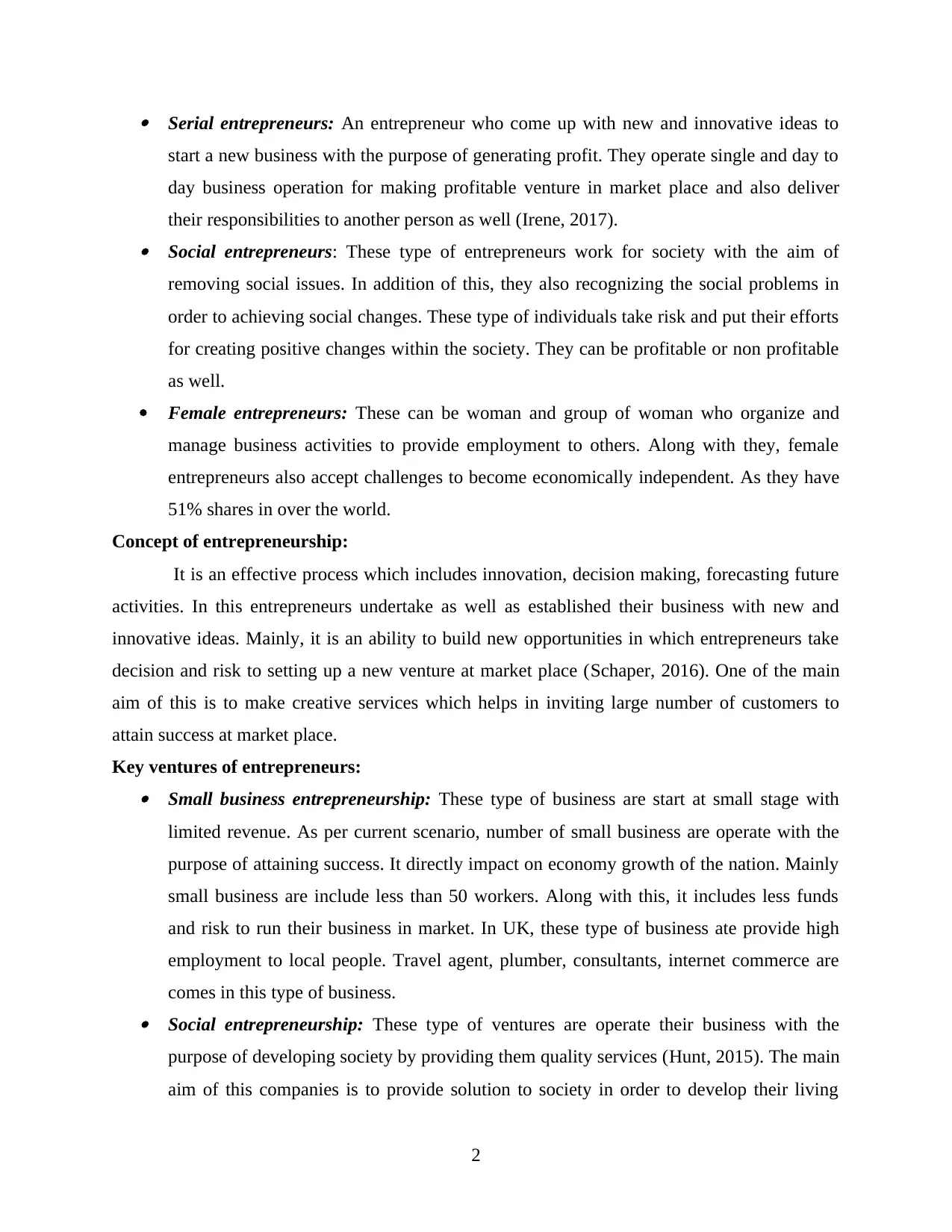
Serial entrepreneurs: An entrepreneur who come up with new and innovative ideas to
start a new business with the purpose of generating profit. They operate single and day to
day business operation for making profitable venture in market place and also deliver
their responsibilities to another person as well (Irene, 2017). Social entrepreneurs: These type of entrepreneurs work for society with the aim of
removing social issues. In addition of this, they also recognizing the social problems in
order to achieving social changes. These type of individuals take risk and put their efforts
for creating positive changes within the society. They can be profitable or non profitable
as well.
Female entrepreneurs: These can be woman and group of woman who organize and
manage business activities to provide employment to others. Along with they, female
entrepreneurs also accept challenges to become economically independent. As they have
51% shares in over the world.
Concept of entrepreneurship:
It is an effective process which includes innovation, decision making, forecasting future
activities. In this entrepreneurs undertake as well as established their business with new and
innovative ideas. Mainly, it is an ability to build new opportunities in which entrepreneurs take
decision and risk to setting up a new venture at market place (Schaper, 2016). One of the main
aim of this is to make creative services which helps in inviting large number of customers to
attain success at market place.
Key ventures of entrepreneurs: Small business entrepreneurship: These type of business are start at small stage with
limited revenue. As per current scenario, number of small business are operate with the
purpose of attaining success. It directly impact on economy growth of the nation. Mainly
small business are include less than 50 workers. Along with this, it includes less funds
and risk to run their business in market. In UK, these type of business ate provide high
employment to local people. Travel agent, plumber, consultants, internet commerce are
comes in this type of business. Social entrepreneurship: These type of ventures are operate their business with the
purpose of developing society by providing them quality services (Hunt, 2015). The main
aim of this companies is to provide solution to society in order to develop their living
2
start a new business with the purpose of generating profit. They operate single and day to
day business operation for making profitable venture in market place and also deliver
their responsibilities to another person as well (Irene, 2017). Social entrepreneurs: These type of entrepreneurs work for society with the aim of
removing social issues. In addition of this, they also recognizing the social problems in
order to achieving social changes. These type of individuals take risk and put their efforts
for creating positive changes within the society. They can be profitable or non profitable
as well.
Female entrepreneurs: These can be woman and group of woman who organize and
manage business activities to provide employment to others. Along with they, female
entrepreneurs also accept challenges to become economically independent. As they have
51% shares in over the world.
Concept of entrepreneurship:
It is an effective process which includes innovation, decision making, forecasting future
activities. In this entrepreneurs undertake as well as established their business with new and
innovative ideas. Mainly, it is an ability to build new opportunities in which entrepreneurs take
decision and risk to setting up a new venture at market place (Schaper, 2016). One of the main
aim of this is to make creative services which helps in inviting large number of customers to
attain success at market place.
Key ventures of entrepreneurs: Small business entrepreneurship: These type of business are start at small stage with
limited revenue. As per current scenario, number of small business are operate with the
purpose of attaining success. It directly impact on economy growth of the nation. Mainly
small business are include less than 50 workers. Along with this, it includes less funds
and risk to run their business in market. In UK, these type of business ate provide high
employment to local people. Travel agent, plumber, consultants, internet commerce are
comes in this type of business. Social entrepreneurship: These type of ventures are operate their business with the
purpose of developing society by providing them quality services (Hunt, 2015). The main
aim of this companies is to provide solution to society in order to develop their living
2
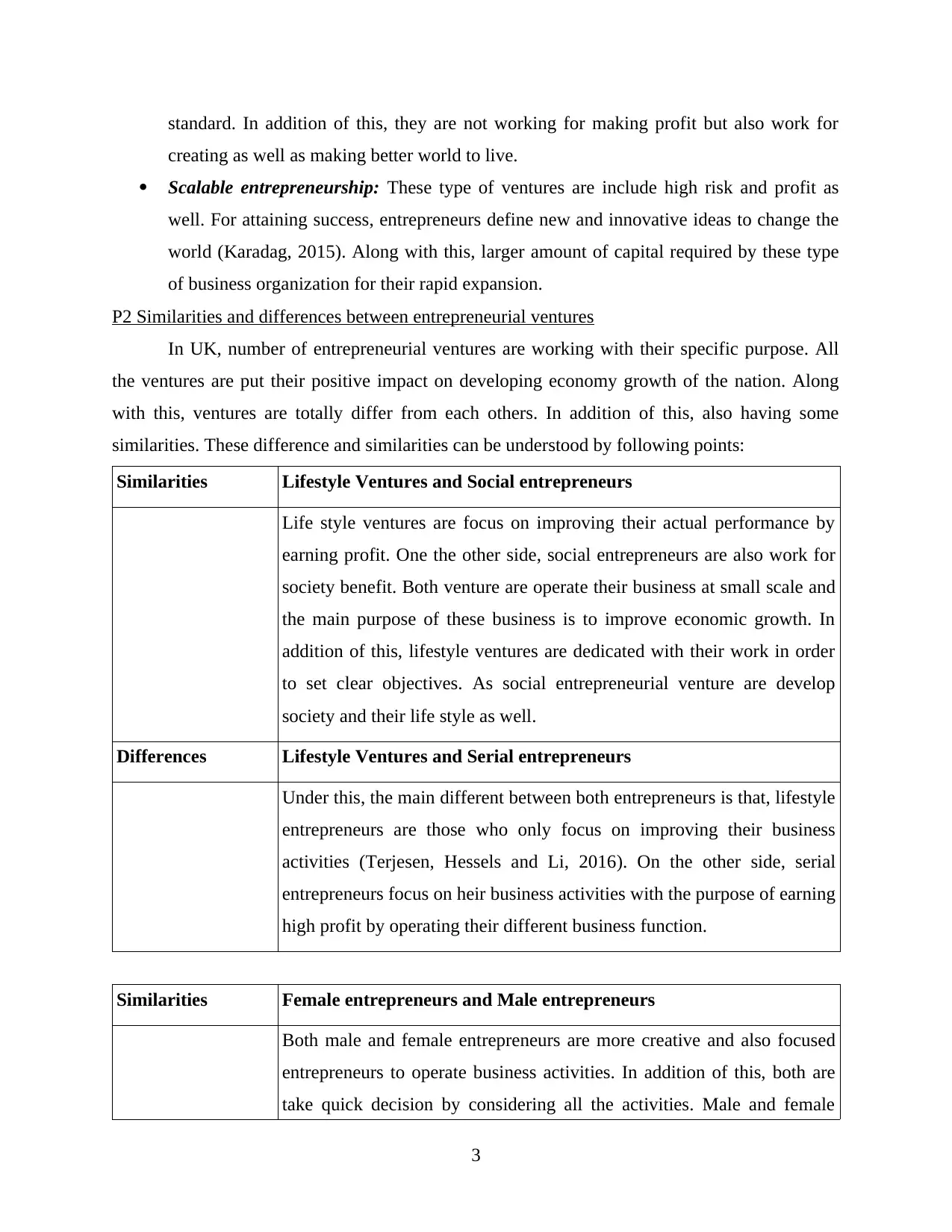
standard. In addition of this, they are not working for making profit but also work for
creating as well as making better world to live.
Scalable entrepreneurship: These type of ventures are include high risk and profit as
well. For attaining success, entrepreneurs define new and innovative ideas to change the
world (Karadag, 2015). Along with this, larger amount of capital required by these type
of business organization for their rapid expansion.
P2 Similarities and differences between entrepreneurial ventures
In UK, number of entrepreneurial ventures are working with their specific purpose. All
the ventures are put their positive impact on developing economy growth of the nation. Along
with this, ventures are totally differ from each others. In addition of this, also having some
similarities. These difference and similarities can be understood by following points:
Similarities Lifestyle Ventures and Social entrepreneurs
Life style ventures are focus on improving their actual performance by
earning profit. One the other side, social entrepreneurs are also work for
society benefit. Both venture are operate their business at small scale and
the main purpose of these business is to improve economic growth. In
addition of this, lifestyle ventures are dedicated with their work in order
to set clear objectives. As social entrepreneurial venture are develop
society and their life style as well.
Differences Lifestyle Ventures and Serial entrepreneurs
Under this, the main different between both entrepreneurs is that, lifestyle
entrepreneurs are those who only focus on improving their business
activities (Terjesen, Hessels and Li, 2016). On the other side, serial
entrepreneurs focus on heir business activities with the purpose of earning
high profit by operating their different business function.
Similarities Female entrepreneurs and Male entrepreneurs
Both male and female entrepreneurs are more creative and also focused
entrepreneurs to operate business activities. In addition of this, both are
take quick decision by considering all the activities. Male and female
3
creating as well as making better world to live.
Scalable entrepreneurship: These type of ventures are include high risk and profit as
well. For attaining success, entrepreneurs define new and innovative ideas to change the
world (Karadag, 2015). Along with this, larger amount of capital required by these type
of business organization for their rapid expansion.
P2 Similarities and differences between entrepreneurial ventures
In UK, number of entrepreneurial ventures are working with their specific purpose. All
the ventures are put their positive impact on developing economy growth of the nation. Along
with this, ventures are totally differ from each others. In addition of this, also having some
similarities. These difference and similarities can be understood by following points:
Similarities Lifestyle Ventures and Social entrepreneurs
Life style ventures are focus on improving their actual performance by
earning profit. One the other side, social entrepreneurs are also work for
society benefit. Both venture are operate their business at small scale and
the main purpose of these business is to improve economic growth. In
addition of this, lifestyle ventures are dedicated with their work in order
to set clear objectives. As social entrepreneurial venture are develop
society and their life style as well.
Differences Lifestyle Ventures and Serial entrepreneurs
Under this, the main different between both entrepreneurs is that, lifestyle
entrepreneurs are those who only focus on improving their business
activities (Terjesen, Hessels and Li, 2016). On the other side, serial
entrepreneurs focus on heir business activities with the purpose of earning
high profit by operating their different business function.
Similarities Female entrepreneurs and Male entrepreneurs
Both male and female entrepreneurs are more creative and also focused
entrepreneurs to operate business activities. In addition of this, both are
take quick decision by considering all the activities. Male and female
3
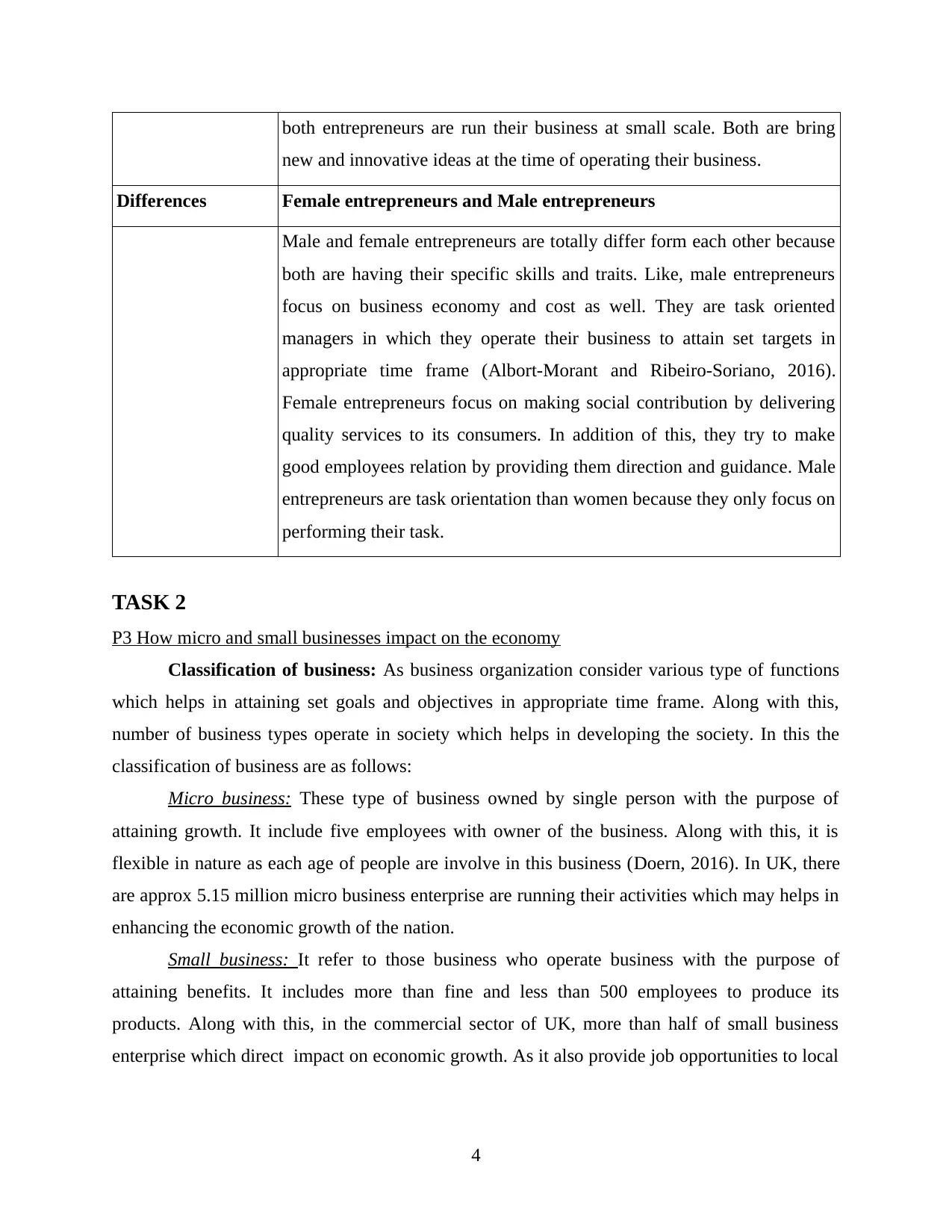
both entrepreneurs are run their business at small scale. Both are bring
new and innovative ideas at the time of operating their business.
Differences Female entrepreneurs and Male entrepreneurs
Male and female entrepreneurs are totally differ form each other because
both are having their specific skills and traits. Like, male entrepreneurs
focus on business economy and cost as well. They are task oriented
managers in which they operate their business to attain set targets in
appropriate time frame (Albort-Morant and Ribeiro-Soriano, 2016).
Female entrepreneurs focus on making social contribution by delivering
quality services to its consumers. In addition of this, they try to make
good employees relation by providing them direction and guidance. Male
entrepreneurs are task orientation than women because they only focus on
performing their task.
TASK 2
P3 How micro and small businesses impact on the economy
Classification of business: As business organization consider various type of functions
which helps in attaining set goals and objectives in appropriate time frame. Along with this,
number of business types operate in society which helps in developing the society. In this the
classification of business are as follows:
Micro business: These type of business owned by single person with the purpose of
attaining growth. It include five employees with owner of the business. Along with this, it is
flexible in nature as each age of people are involve in this business (Doern, 2016). In UK, there
are approx 5.15 million micro business enterprise are running their activities which may helps in
enhancing the economic growth of the nation.
Small business: It refer to those business who operate business with the purpose of
attaining benefits. It includes more than fine and less than 500 employees to produce its
products. Along with this, in the commercial sector of UK, more than half of small business
enterprise which direct impact on economic growth. As it also provide job opportunities to local
4
new and innovative ideas at the time of operating their business.
Differences Female entrepreneurs and Male entrepreneurs
Male and female entrepreneurs are totally differ form each other because
both are having their specific skills and traits. Like, male entrepreneurs
focus on business economy and cost as well. They are task oriented
managers in which they operate their business to attain set targets in
appropriate time frame (Albort-Morant and Ribeiro-Soriano, 2016).
Female entrepreneurs focus on making social contribution by delivering
quality services to its consumers. In addition of this, they try to make
good employees relation by providing them direction and guidance. Male
entrepreneurs are task orientation than women because they only focus on
performing their task.
TASK 2
P3 How micro and small businesses impact on the economy
Classification of business: As business organization consider various type of functions
which helps in attaining set goals and objectives in appropriate time frame. Along with this,
number of business types operate in society which helps in developing the society. In this the
classification of business are as follows:
Micro business: These type of business owned by single person with the purpose of
attaining growth. It include five employees with owner of the business. Along with this, it is
flexible in nature as each age of people are involve in this business (Doern, 2016). In UK, there
are approx 5.15 million micro business enterprise are running their activities which may helps in
enhancing the economic growth of the nation.
Small business: It refer to those business who operate business with the purpose of
attaining benefits. It includes more than fine and less than 500 employees to produce its
products. Along with this, in the commercial sector of UK, more than half of small business
enterprise which direct impact on economic growth. As it also provide job opportunities to local
4
Paraphrase This Document
Need a fresh take? Get an instant paraphrase of this document with our AI Paraphraser
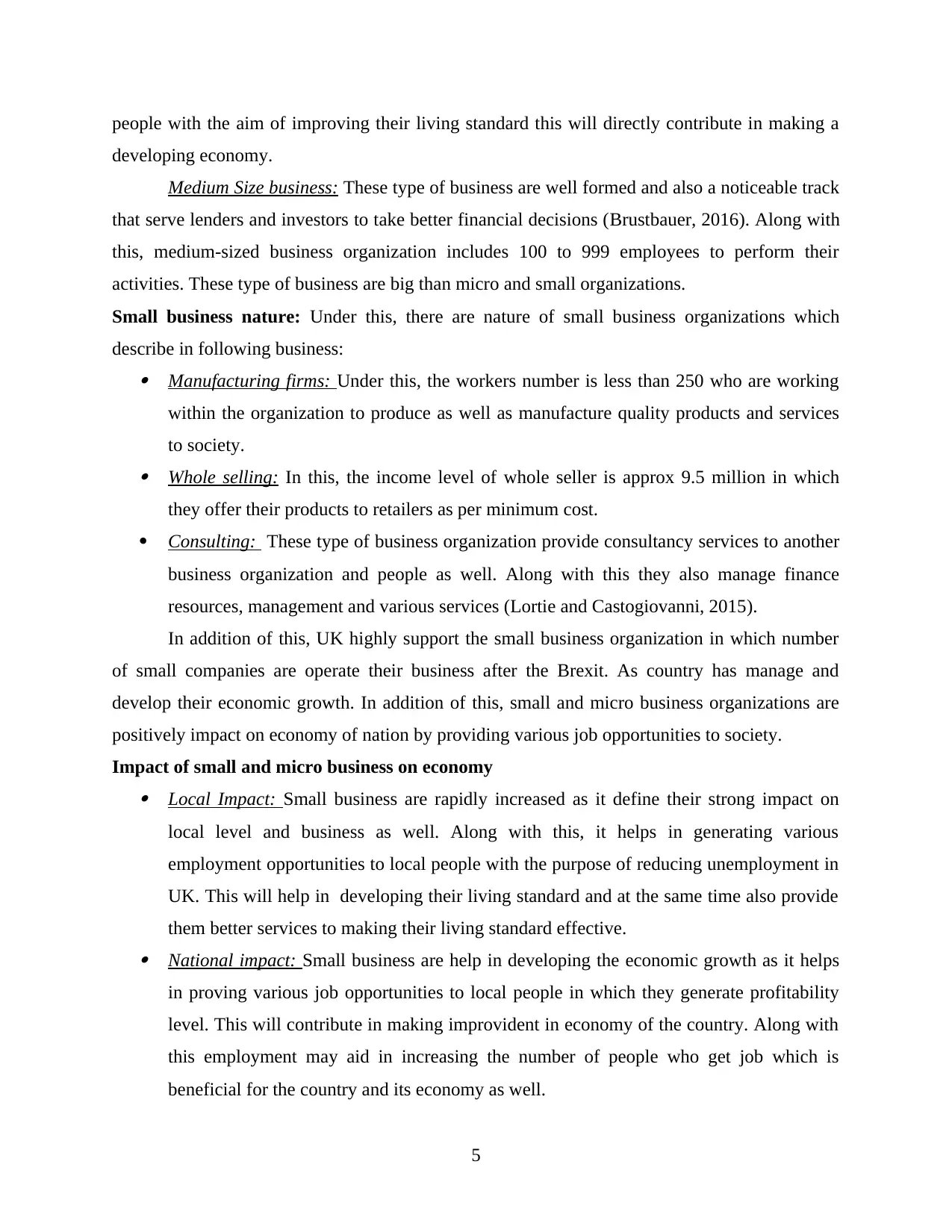
people with the aim of improving their living standard this will directly contribute in making a
developing economy.
Medium Size business: These type of business are well formed and also a noticeable track
that serve lenders and investors to take better financial decisions (Brustbauer, 2016). Along with
this, medium-sized business organization includes 100 to 999 employees to perform their
activities. These type of business are big than micro and small organizations.
Small business nature: Under this, there are nature of small business organizations which
describe in following business: Manufacturing firms: Under this, the workers number is less than 250 who are working
within the organization to produce as well as manufacture quality products and services
to society. Whole selling: In this, the income level of whole seller is approx 9.5 million in which
they offer their products to retailers as per minimum cost.
Consulting: These type of business organization provide consultancy services to another
business organization and people as well. Along with this they also manage finance
resources, management and various services (Lortie and Castogiovanni, 2015).
In addition of this, UK highly support the small business organization in which number
of small companies are operate their business after the Brexit. As country has manage and
develop their economic growth. In addition of this, small and micro business organizations are
positively impact on economy of nation by providing various job opportunities to society.
Impact of small and micro business on economy Local Impact: Small business are rapidly increased as it define their strong impact on
local level and business as well. Along with this, it helps in generating various
employment opportunities to local people with the purpose of reducing unemployment in
UK. This will help in developing their living standard and at the same time also provide
them better services to making their living standard effective. National impact: Small business are help in developing the economic growth as it helps
in proving various job opportunities to local people in which they generate profitability
level. This will contribute in making improvident in economy of the country. Along with
this employment may aid in increasing the number of people who get job which is
beneficial for the country and its economy as well.
5
developing economy.
Medium Size business: These type of business are well formed and also a noticeable track
that serve lenders and investors to take better financial decisions (Brustbauer, 2016). Along with
this, medium-sized business organization includes 100 to 999 employees to perform their
activities. These type of business are big than micro and small organizations.
Small business nature: Under this, there are nature of small business organizations which
describe in following business: Manufacturing firms: Under this, the workers number is less than 250 who are working
within the organization to produce as well as manufacture quality products and services
to society. Whole selling: In this, the income level of whole seller is approx 9.5 million in which
they offer their products to retailers as per minimum cost.
Consulting: These type of business organization provide consultancy services to another
business organization and people as well. Along with this they also manage finance
resources, management and various services (Lortie and Castogiovanni, 2015).
In addition of this, UK highly support the small business organization in which number
of small companies are operate their business after the Brexit. As country has manage and
develop their economic growth. In addition of this, small and micro business organizations are
positively impact on economy of nation by providing various job opportunities to society.
Impact of small and micro business on economy Local Impact: Small business are rapidly increased as it define their strong impact on
local level and business as well. Along with this, it helps in generating various
employment opportunities to local people with the purpose of reducing unemployment in
UK. This will help in developing their living standard and at the same time also provide
them better services to making their living standard effective. National impact: Small business are help in developing the economic growth as it helps
in proving various job opportunities to local people in which they generate profitability
level. This will contribute in making improvident in economy of the country. Along with
this employment may aid in increasing the number of people who get job which is
beneficial for the country and its economy as well.
5
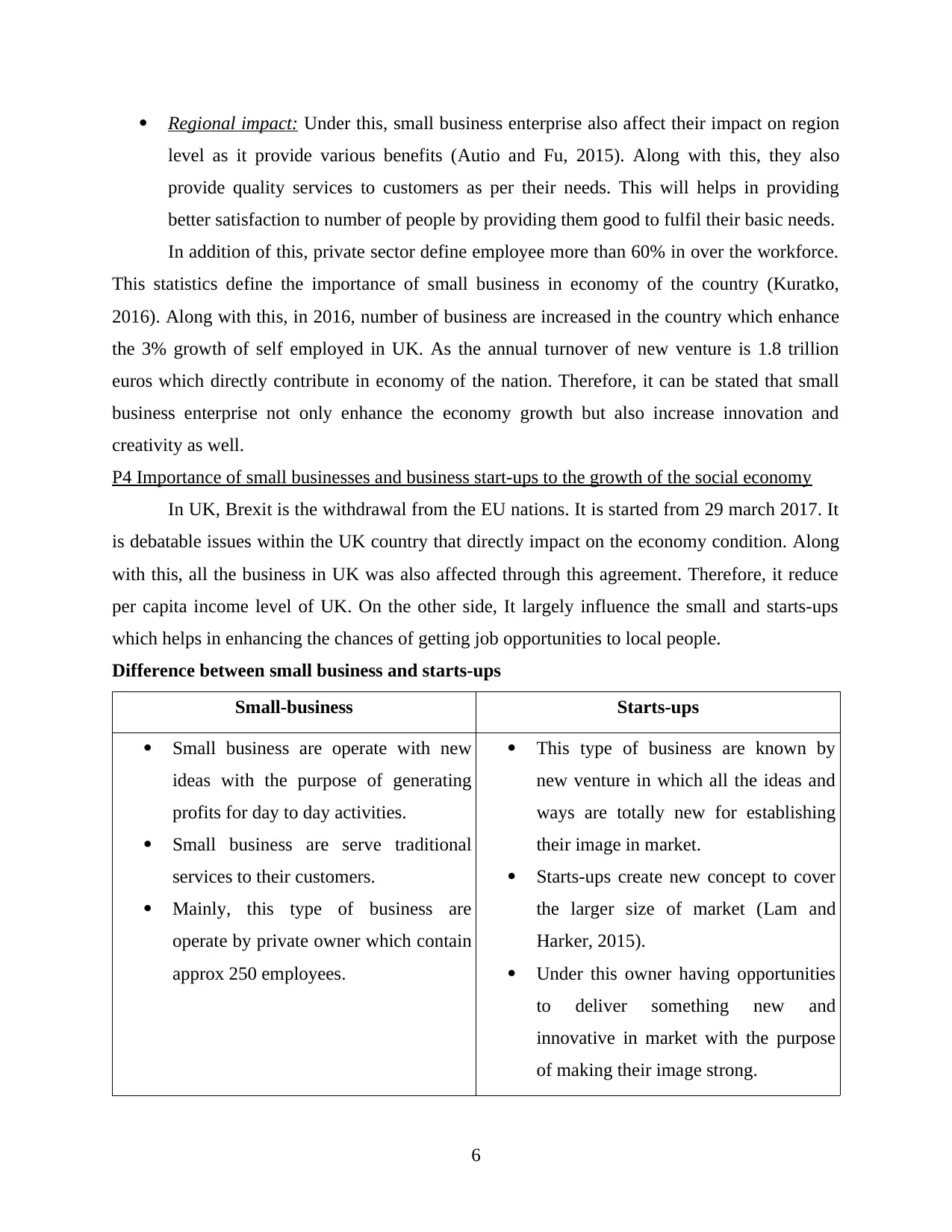
Regional impact: Under this, small business enterprise also affect their impact on region
level as it provide various benefits (Autio and Fu, 2015). Along with this, they also
provide quality services to customers as per their needs. This will helps in providing
better satisfaction to number of people by providing them good to fulfil their basic needs.
In addition of this, private sector define employee more than 60% in over the workforce.
This statistics define the importance of small business in economy of the country (Kuratko,
2016). Along with this, in 2016, number of business are increased in the country which enhance
the 3% growth of self employed in UK. As the annual turnover of new venture is 1.8 trillion
euros which directly contribute in economy of the nation. Therefore, it can be stated that small
business enterprise not only enhance the economy growth but also increase innovation and
creativity as well.
P4 Importance of small businesses and business start-ups to the growth of the social economy
In UK, Brexit is the withdrawal from the EU nations. It is started from 29 march 2017. It
is debatable issues within the UK country that directly impact on the economy condition. Along
with this, all the business in UK was also affected through this agreement. Therefore, it reduce
per capita income level of UK. On the other side, It largely influence the small and starts-ups
which helps in enhancing the chances of getting job opportunities to local people.
Difference between small business and starts-ups
Small-business Starts-ups
Small business are operate with new
ideas with the purpose of generating
profits for day to day activities.
Small business are serve traditional
services to their customers.
Mainly, this type of business are
operate by private owner which contain
approx 250 employees.
This type of business are known by
new venture in which all the ideas and
ways are totally new for establishing
their image in market.
Starts-ups create new concept to cover
the larger size of market (Lam and
Harker, 2015).
Under this owner having opportunities
to deliver something new and
innovative in market with the purpose
of making their image strong.
6
level as it provide various benefits (Autio and Fu, 2015). Along with this, they also
provide quality services to customers as per their needs. This will helps in providing
better satisfaction to number of people by providing them good to fulfil their basic needs.
In addition of this, private sector define employee more than 60% in over the workforce.
This statistics define the importance of small business in economy of the country (Kuratko,
2016). Along with this, in 2016, number of business are increased in the country which enhance
the 3% growth of self employed in UK. As the annual turnover of new venture is 1.8 trillion
euros which directly contribute in economy of the nation. Therefore, it can be stated that small
business enterprise not only enhance the economy growth but also increase innovation and
creativity as well.
P4 Importance of small businesses and business start-ups to the growth of the social economy
In UK, Brexit is the withdrawal from the EU nations. It is started from 29 march 2017. It
is debatable issues within the UK country that directly impact on the economy condition. Along
with this, all the business in UK was also affected through this agreement. Therefore, it reduce
per capita income level of UK. On the other side, It largely influence the small and starts-ups
which helps in enhancing the chances of getting job opportunities to local people.
Difference between small business and starts-ups
Small-business Starts-ups
Small business are operate with new
ideas with the purpose of generating
profits for day to day activities.
Small business are serve traditional
services to their customers.
Mainly, this type of business are
operate by private owner which contain
approx 250 employees.
This type of business are known by
new venture in which all the ideas and
ways are totally new for establishing
their image in market.
Starts-ups create new concept to cover
the larger size of market (Lam and
Harker, 2015).
Under this owner having opportunities
to deliver something new and
innovative in market with the purpose
of making their image strong.
6
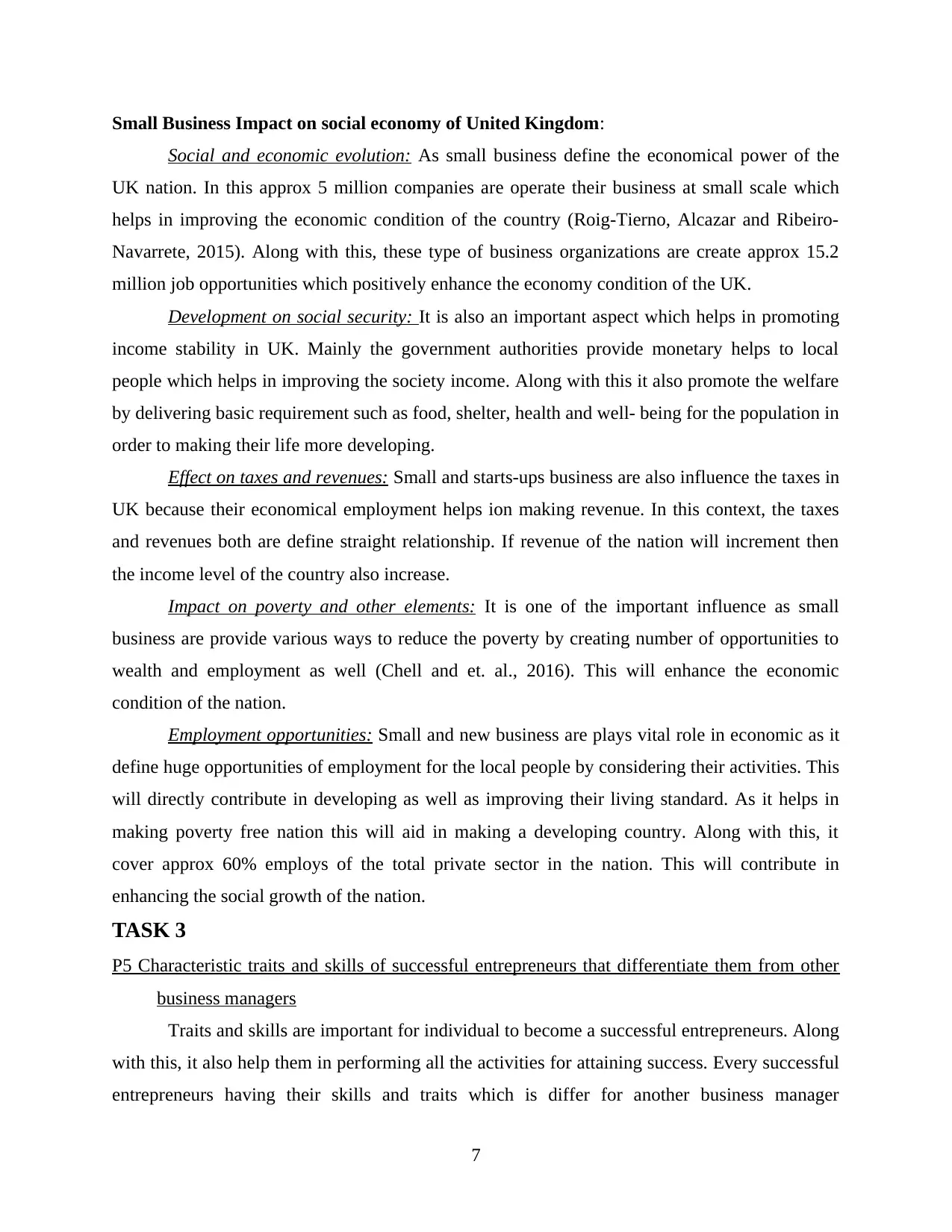
Small Business Impact on social economy of United Kingdom:
Social and economic evolution: As small business define the economical power of the
UK nation. In this approx 5 million companies are operate their business at small scale which
helps in improving the economic condition of the country (Roig-Tierno, Alcazar and Ribeiro-
Navarrete, 2015). Along with this, these type of business organizations are create approx 15.2
million job opportunities which positively enhance the economy condition of the UK.
Development on social security: It is also an important aspect which helps in promoting
income stability in UK. Mainly the government authorities provide monetary helps to local
people which helps in improving the society income. Along with this it also promote the welfare
by delivering basic requirement such as food, shelter, health and well- being for the population in
order to making their life more developing.
Effect on taxes and revenues: Small and starts-ups business are also influence the taxes in
UK because their economical employment helps ion making revenue. In this context, the taxes
and revenues both are define straight relationship. If revenue of the nation will increment then
the income level of the country also increase.
Impact on poverty and other elements: It is one of the important influence as small
business are provide various ways to reduce the poverty by creating number of opportunities to
wealth and employment as well (Chell and et. al., 2016). This will enhance the economic
condition of the nation.
Employment opportunities: Small and new business are plays vital role in economic as it
define huge opportunities of employment for the local people by considering their activities. This
will directly contribute in developing as well as improving their living standard. As it helps in
making poverty free nation this will aid in making a developing country. Along with this, it
cover approx 60% employs of the total private sector in the nation. This will contribute in
enhancing the social growth of the nation.
TASK 3
P5 Characteristic traits and skills of successful entrepreneurs that differentiate them from other
business managers
Traits and skills are important for individual to become a successful entrepreneurs. Along
with this, it also help them in performing all the activities for attaining success. Every successful
entrepreneurs having their skills and traits which is differ for another business manager
7
Social and economic evolution: As small business define the economical power of the
UK nation. In this approx 5 million companies are operate their business at small scale which
helps in improving the economic condition of the country (Roig-Tierno, Alcazar and Ribeiro-
Navarrete, 2015). Along with this, these type of business organizations are create approx 15.2
million job opportunities which positively enhance the economy condition of the UK.
Development on social security: It is also an important aspect which helps in promoting
income stability in UK. Mainly the government authorities provide monetary helps to local
people which helps in improving the society income. Along with this it also promote the welfare
by delivering basic requirement such as food, shelter, health and well- being for the population in
order to making their life more developing.
Effect on taxes and revenues: Small and starts-ups business are also influence the taxes in
UK because their economical employment helps ion making revenue. In this context, the taxes
and revenues both are define straight relationship. If revenue of the nation will increment then
the income level of the country also increase.
Impact on poverty and other elements: It is one of the important influence as small
business are provide various ways to reduce the poverty by creating number of opportunities to
wealth and employment as well (Chell and et. al., 2016). This will enhance the economic
condition of the nation.
Employment opportunities: Small and new business are plays vital role in economic as it
define huge opportunities of employment for the local people by considering their activities. This
will directly contribute in developing as well as improving their living standard. As it helps in
making poverty free nation this will aid in making a developing country. Along with this, it
cover approx 60% employs of the total private sector in the nation. This will contribute in
enhancing the social growth of the nation.
TASK 3
P5 Characteristic traits and skills of successful entrepreneurs that differentiate them from other
business managers
Traits and skills are important for individual to become a successful entrepreneurs. Along
with this, it also help them in performing all the activities for attaining success. Every successful
entrepreneurs having their skills and traits which is differ for another business manager
7
Secure Best Marks with AI Grader
Need help grading? Try our AI Grader for instant feedback on your assignments.
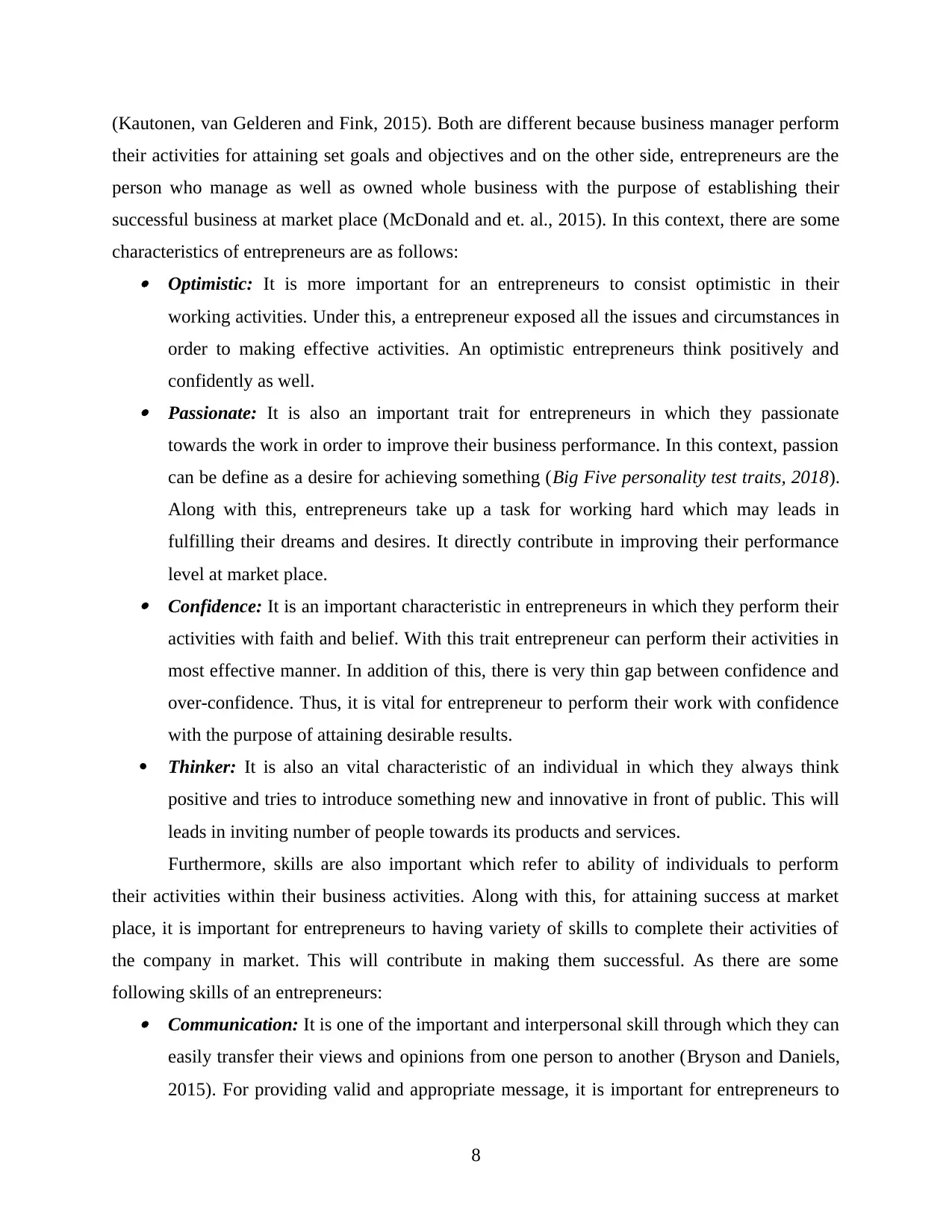
(Kautonen, van Gelderen and Fink, 2015). Both are different because business manager perform
their activities for attaining set goals and objectives and on the other side, entrepreneurs are the
person who manage as well as owned whole business with the purpose of establishing their
successful business at market place (McDonald and et. al., 2015). In this context, there are some
characteristics of entrepreneurs are as follows: Optimistic: It is more important for an entrepreneurs to consist optimistic in their
working activities. Under this, a entrepreneur exposed all the issues and circumstances in
order to making effective activities. An optimistic entrepreneurs think positively and
confidently as well. Passionate: It is also an important trait for entrepreneurs in which they passionate
towards the work in order to improve their business performance. In this context, passion
can be define as a desire for achieving something (Big Five personality test traits, 2018).
Along with this, entrepreneurs take up a task for working hard which may leads in
fulfilling their dreams and desires. It directly contribute in improving their performance
level at market place. Confidence: It is an important characteristic in entrepreneurs in which they perform their
activities with faith and belief. With this trait entrepreneur can perform their activities in
most effective manner. In addition of this, there is very thin gap between confidence and
over-confidence. Thus, it is vital for entrepreneur to perform their work with confidence
with the purpose of attaining desirable results.
Thinker: It is also an vital characteristic of an individual in which they always think
positive and tries to introduce something new and innovative in front of public. This will
leads in inviting number of people towards its products and services.
Furthermore, skills are also important which refer to ability of individuals to perform
their activities within their business activities. Along with this, for attaining success at market
place, it is important for entrepreneurs to having variety of skills to complete their activities of
the company in market. This will contribute in making them successful. As there are some
following skills of an entrepreneurs: Communication: It is one of the important and interpersonal skill through which they can
easily transfer their views and opinions from one person to another (Bryson and Daniels,
2015). For providing valid and appropriate message, it is important for entrepreneurs to
8
their activities for attaining set goals and objectives and on the other side, entrepreneurs are the
person who manage as well as owned whole business with the purpose of establishing their
successful business at market place (McDonald and et. al., 2015). In this context, there are some
characteristics of entrepreneurs are as follows: Optimistic: It is more important for an entrepreneurs to consist optimistic in their
working activities. Under this, a entrepreneur exposed all the issues and circumstances in
order to making effective activities. An optimistic entrepreneurs think positively and
confidently as well. Passionate: It is also an important trait for entrepreneurs in which they passionate
towards the work in order to improve their business performance. In this context, passion
can be define as a desire for achieving something (Big Five personality test traits, 2018).
Along with this, entrepreneurs take up a task for working hard which may leads in
fulfilling their dreams and desires. It directly contribute in improving their performance
level at market place. Confidence: It is an important characteristic in entrepreneurs in which they perform their
activities with faith and belief. With this trait entrepreneur can perform their activities in
most effective manner. In addition of this, there is very thin gap between confidence and
over-confidence. Thus, it is vital for entrepreneur to perform their work with confidence
with the purpose of attaining desirable results.
Thinker: It is also an vital characteristic of an individual in which they always think
positive and tries to introduce something new and innovative in front of public. This will
leads in inviting number of people towards its products and services.
Furthermore, skills are also important which refer to ability of individuals to perform
their activities within their business activities. Along with this, for attaining success at market
place, it is important for entrepreneurs to having variety of skills to complete their activities of
the company in market. This will contribute in making them successful. As there are some
following skills of an entrepreneurs: Communication: It is one of the important and interpersonal skill through which they can
easily transfer their views and opinions from one person to another (Bryson and Daniels,
2015). For providing valid and appropriate message, it is important for entrepreneurs to
8
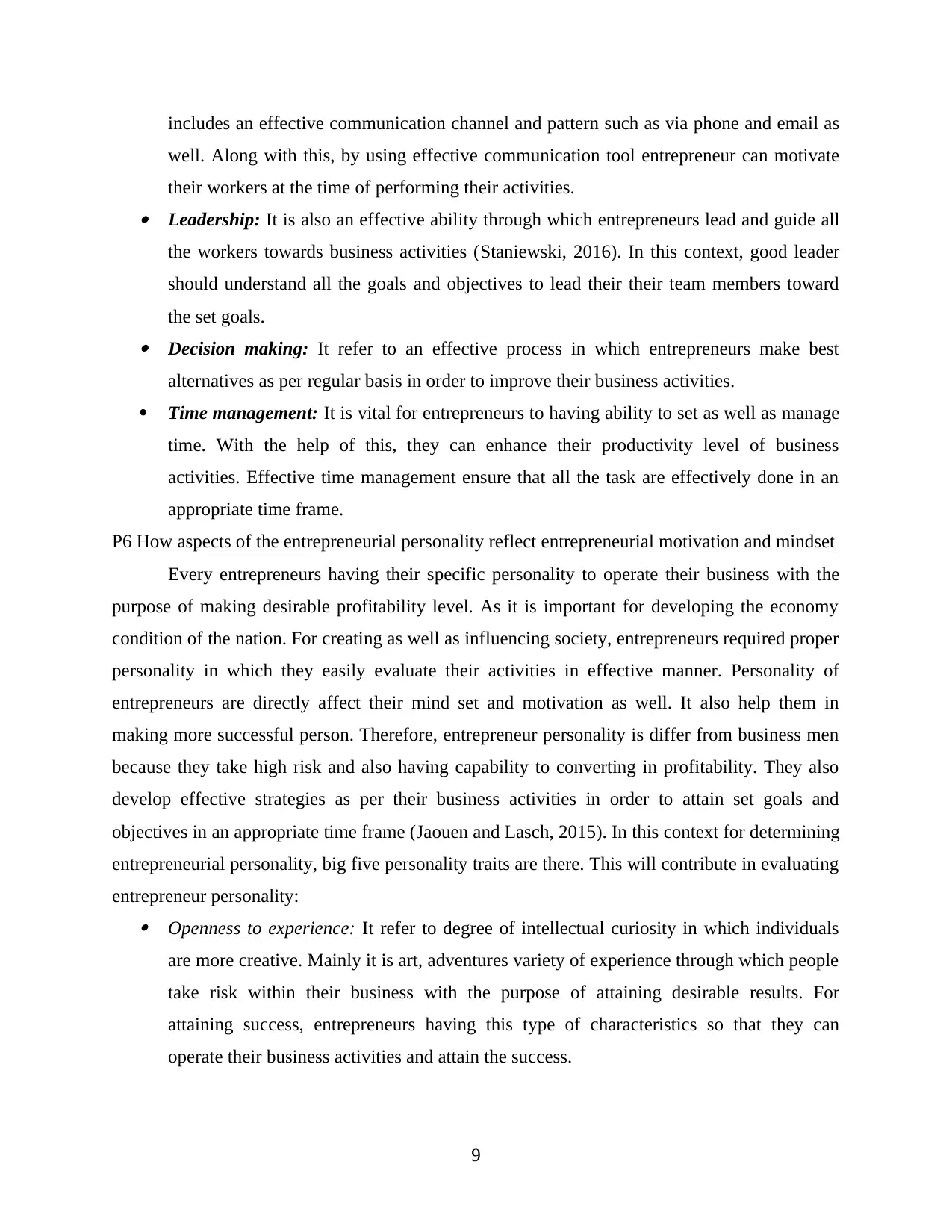
includes an effective communication channel and pattern such as via phone and email as
well. Along with this, by using effective communication tool entrepreneur can motivate
their workers at the time of performing their activities. Leadership: It is also an effective ability through which entrepreneurs lead and guide all
the workers towards business activities (Staniewski, 2016). In this context, good leader
should understand all the goals and objectives to lead their their team members toward
the set goals. Decision making: It refer to an effective process in which entrepreneurs make best
alternatives as per regular basis in order to improve their business activities.
Time management: It is vital for entrepreneurs to having ability to set as well as manage
time. With the help of this, they can enhance their productivity level of business
activities. Effective time management ensure that all the task are effectively done in an
appropriate time frame.
P6 How aspects of the entrepreneurial personality reflect entrepreneurial motivation and mindset
Every entrepreneurs having their specific personality to operate their business with the
purpose of making desirable profitability level. As it is important for developing the economy
condition of the nation. For creating as well as influencing society, entrepreneurs required proper
personality in which they easily evaluate their activities in effective manner. Personality of
entrepreneurs are directly affect their mind set and motivation as well. It also help them in
making more successful person. Therefore, entrepreneur personality is differ from business men
because they take high risk and also having capability to converting in profitability. They also
develop effective strategies as per their business activities in order to attain set goals and
objectives in an appropriate time frame (Jaouen and Lasch, 2015). In this context for determining
entrepreneurial personality, big five personality traits are there. This will contribute in evaluating
entrepreneur personality: Openness to experience: It refer to degree of intellectual curiosity in which individuals
are more creative. Mainly it is art, adventures variety of experience through which people
take risk within their business with the purpose of attaining desirable results. For
attaining success, entrepreneurs having this type of characteristics so that they can
operate their business activities and attain the success.
9
well. Along with this, by using effective communication tool entrepreneur can motivate
their workers at the time of performing their activities. Leadership: It is also an effective ability through which entrepreneurs lead and guide all
the workers towards business activities (Staniewski, 2016). In this context, good leader
should understand all the goals and objectives to lead their their team members toward
the set goals. Decision making: It refer to an effective process in which entrepreneurs make best
alternatives as per regular basis in order to improve their business activities.
Time management: It is vital for entrepreneurs to having ability to set as well as manage
time. With the help of this, they can enhance their productivity level of business
activities. Effective time management ensure that all the task are effectively done in an
appropriate time frame.
P6 How aspects of the entrepreneurial personality reflect entrepreneurial motivation and mindset
Every entrepreneurs having their specific personality to operate their business with the
purpose of making desirable profitability level. As it is important for developing the economy
condition of the nation. For creating as well as influencing society, entrepreneurs required proper
personality in which they easily evaluate their activities in effective manner. Personality of
entrepreneurs are directly affect their mind set and motivation as well. It also help them in
making more successful person. Therefore, entrepreneur personality is differ from business men
because they take high risk and also having capability to converting in profitability. They also
develop effective strategies as per their business activities in order to attain set goals and
objectives in an appropriate time frame (Jaouen and Lasch, 2015). In this context for determining
entrepreneurial personality, big five personality traits are there. This will contribute in evaluating
entrepreneur personality: Openness to experience: It refer to degree of intellectual curiosity in which individuals
are more creative. Mainly it is art, adventures variety of experience through which people
take risk within their business with the purpose of attaining desirable results. For
attaining success, entrepreneurs having this type of characteristics so that they can
operate their business activities and attain the success.
9
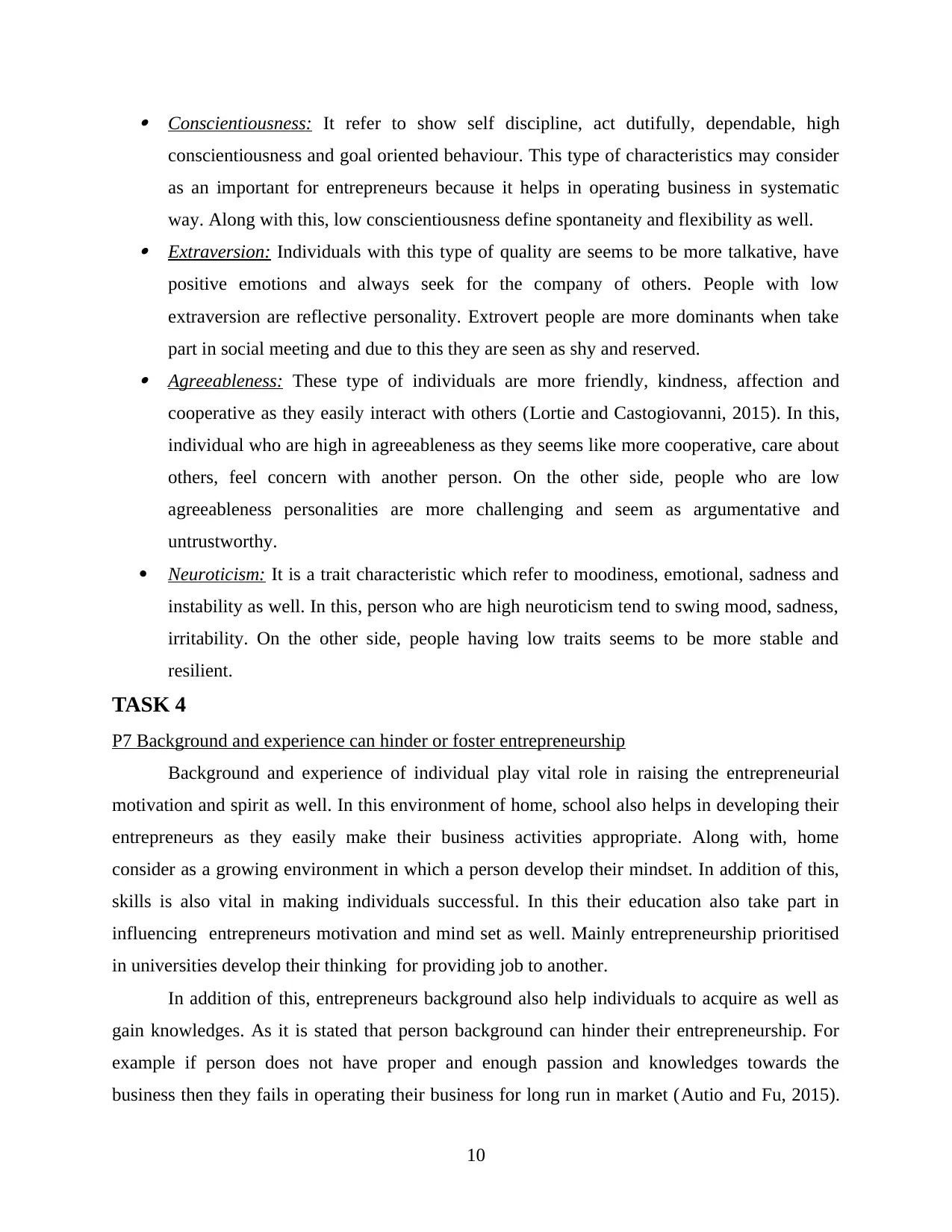
Conscientiousness: It refer to show self discipline, act dutifully, dependable, high
conscientiousness and goal oriented behaviour. This type of characteristics may consider
as an important for entrepreneurs because it helps in operating business in systematic
way. Along with this, low conscientiousness define spontaneity and flexibility as well. Extraversion: Individuals with this type of quality are seems to be more talkative, have
positive emotions and always seek for the company of others. People with low
extraversion are reflective personality. Extrovert people are more dominants when take
part in social meeting and due to this they are seen as shy and reserved. Agreeableness: These type of individuals are more friendly, kindness, affection and
cooperative as they easily interact with others (Lortie and Castogiovanni, 2015). In this,
individual who are high in agreeableness as they seems like more cooperative, care about
others, feel concern with another person. On the other side, people who are low
agreeableness personalities are more challenging and seem as argumentative and
untrustworthy.
Neuroticism: It is a trait characteristic which refer to moodiness, emotional, sadness and
instability as well. In this, person who are high neuroticism tend to swing mood, sadness,
irritability. On the other side, people having low traits seems to be more stable and
resilient.
TASK 4
P7 Background and experience can hinder or foster entrepreneurship
Background and experience of individual play vital role in raising the entrepreneurial
motivation and spirit as well. In this environment of home, school also helps in developing their
entrepreneurs as they easily make their business activities appropriate. Along with, home
consider as a growing environment in which a person develop their mindset. In addition of this,
skills is also vital in making individuals successful. In this their education also take part in
influencing entrepreneurs motivation and mind set as well. Mainly entrepreneurship prioritised
in universities develop their thinking for providing job to another.
In addition of this, entrepreneurs background also help individuals to acquire as well as
gain knowledges. As it is stated that person background can hinder their entrepreneurship. For
example if person does not have proper and enough passion and knowledges towards the
business then they fails in operating their business for long run in market (Autio and Fu, 2015).
10
conscientiousness and goal oriented behaviour. This type of characteristics may consider
as an important for entrepreneurs because it helps in operating business in systematic
way. Along with this, low conscientiousness define spontaneity and flexibility as well. Extraversion: Individuals with this type of quality are seems to be more talkative, have
positive emotions and always seek for the company of others. People with low
extraversion are reflective personality. Extrovert people are more dominants when take
part in social meeting and due to this they are seen as shy and reserved. Agreeableness: These type of individuals are more friendly, kindness, affection and
cooperative as they easily interact with others (Lortie and Castogiovanni, 2015). In this,
individual who are high in agreeableness as they seems like more cooperative, care about
others, feel concern with another person. On the other side, people who are low
agreeableness personalities are more challenging and seem as argumentative and
untrustworthy.
Neuroticism: It is a trait characteristic which refer to moodiness, emotional, sadness and
instability as well. In this, person who are high neuroticism tend to swing mood, sadness,
irritability. On the other side, people having low traits seems to be more stable and
resilient.
TASK 4
P7 Background and experience can hinder or foster entrepreneurship
Background and experience of individual play vital role in raising the entrepreneurial
motivation and spirit as well. In this environment of home, school also helps in developing their
entrepreneurs as they easily make their business activities appropriate. Along with, home
consider as a growing environment in which a person develop their mindset. In addition of this,
skills is also vital in making individuals successful. In this their education also take part in
influencing entrepreneurs motivation and mind set as well. Mainly entrepreneurship prioritised
in universities develop their thinking for providing job to another.
In addition of this, entrepreneurs background also help individuals to acquire as well as
gain knowledges. As it is stated that person background can hinder their entrepreneurship. For
example if person does not have proper and enough passion and knowledges towards the
business then they fails in operating their business for long run in market (Autio and Fu, 2015).
10
Paraphrase This Document
Need a fresh take? Get an instant paraphrase of this document with our AI Paraphraser
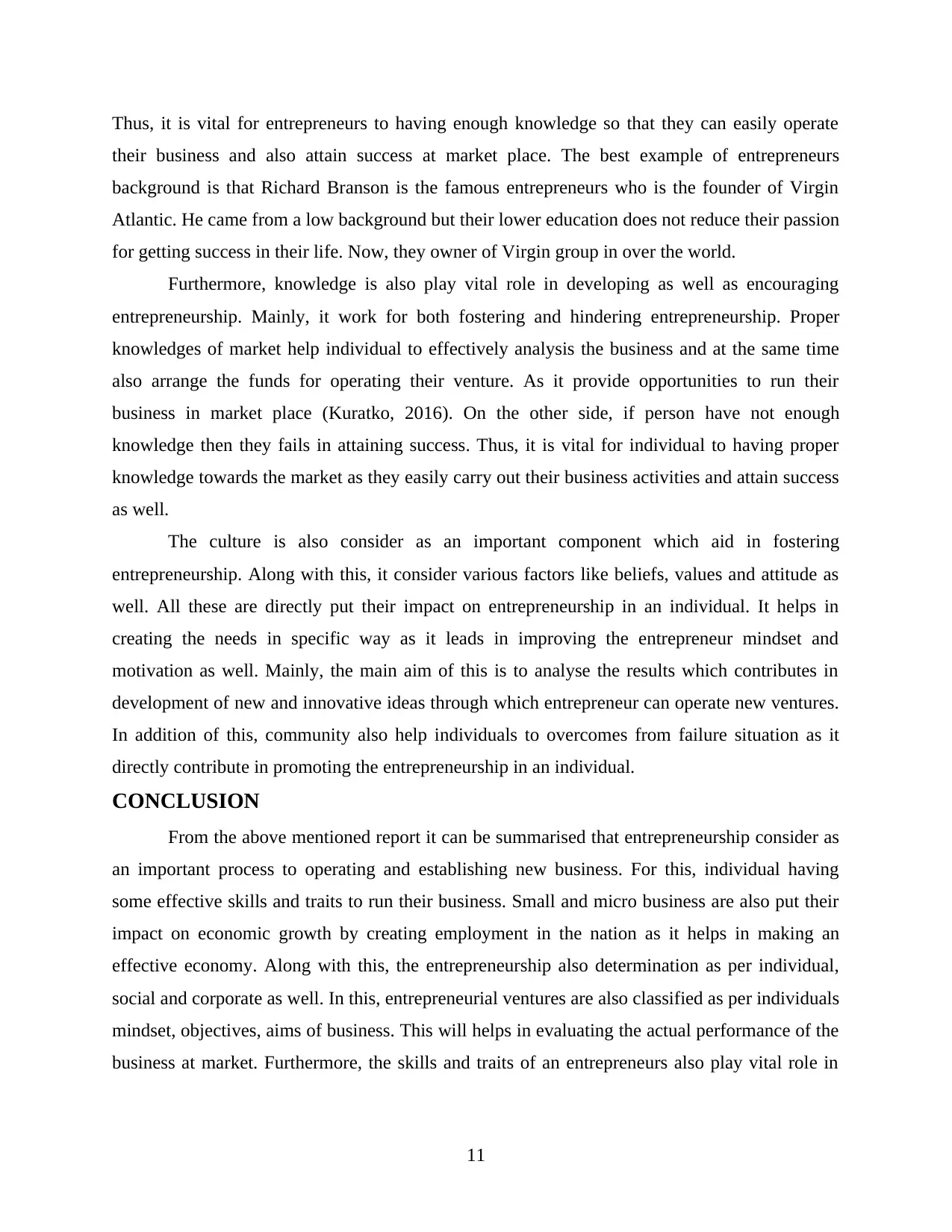
Thus, it is vital for entrepreneurs to having enough knowledge so that they can easily operate
their business and also attain success at market place. The best example of entrepreneurs
background is that Richard Branson is the famous entrepreneurs who is the founder of Virgin
Atlantic. He came from a low background but their lower education does not reduce their passion
for getting success in their life. Now, they owner of Virgin group in over the world.
Furthermore, knowledge is also play vital role in developing as well as encouraging
entrepreneurship. Mainly, it work for both fostering and hindering entrepreneurship. Proper
knowledges of market help individual to effectively analysis the business and at the same time
also arrange the funds for operating their venture. As it provide opportunities to run their
business in market place (Kuratko, 2016). On the other side, if person have not enough
knowledge then they fails in attaining success. Thus, it is vital for individual to having proper
knowledge towards the market as they easily carry out their business activities and attain success
as well.
The culture is also consider as an important component which aid in fostering
entrepreneurship. Along with this, it consider various factors like beliefs, values and attitude as
well. All these are directly put their impact on entrepreneurship in an individual. It helps in
creating the needs in specific way as it leads in improving the entrepreneur mindset and
motivation as well. Mainly, the main aim of this is to analyse the results which contributes in
development of new and innovative ideas through which entrepreneur can operate new ventures.
In addition of this, community also help individuals to overcomes from failure situation as it
directly contribute in promoting the entrepreneurship in an individual.
CONCLUSION
From the above mentioned report it can be summarised that entrepreneurship consider as
an important process to operating and establishing new business. For this, individual having
some effective skills and traits to run their business. Small and micro business are also put their
impact on economic growth by creating employment in the nation as it helps in making an
effective economy. Along with this, the entrepreneurship also determination as per individual,
social and corporate as well. In this, entrepreneurial ventures are also classified as per individuals
mindset, objectives, aims of business. This will helps in evaluating the actual performance of the
business at market. Furthermore, the skills and traits of an entrepreneurs also play vital role in
11
their business and also attain success at market place. The best example of entrepreneurs
background is that Richard Branson is the famous entrepreneurs who is the founder of Virgin
Atlantic. He came from a low background but their lower education does not reduce their passion
for getting success in their life. Now, they owner of Virgin group in over the world.
Furthermore, knowledge is also play vital role in developing as well as encouraging
entrepreneurship. Mainly, it work for both fostering and hindering entrepreneurship. Proper
knowledges of market help individual to effectively analysis the business and at the same time
also arrange the funds for operating their venture. As it provide opportunities to run their
business in market place (Kuratko, 2016). On the other side, if person have not enough
knowledge then they fails in attaining success. Thus, it is vital for individual to having proper
knowledge towards the market as they easily carry out their business activities and attain success
as well.
The culture is also consider as an important component which aid in fostering
entrepreneurship. Along with this, it consider various factors like beliefs, values and attitude as
well. All these are directly put their impact on entrepreneurship in an individual. It helps in
creating the needs in specific way as it leads in improving the entrepreneur mindset and
motivation as well. Mainly, the main aim of this is to analyse the results which contributes in
development of new and innovative ideas through which entrepreneur can operate new ventures.
In addition of this, community also help individuals to overcomes from failure situation as it
directly contribute in promoting the entrepreneurship in an individual.
CONCLUSION
From the above mentioned report it can be summarised that entrepreneurship consider as
an important process to operating and establishing new business. For this, individual having
some effective skills and traits to run their business. Small and micro business are also put their
impact on economic growth by creating employment in the nation as it helps in making an
effective economy. Along with this, the entrepreneurship also determination as per individual,
social and corporate as well. In this, entrepreneurial ventures are also classified as per individuals
mindset, objectives, aims of business. This will helps in evaluating the actual performance of the
business at market. Furthermore, the skills and traits of an entrepreneurs also play vital role in
11

attaining set goals and objectives in an appropriate time frame. To be a successful entrepreneur,
right skills and passion is vital which may contribute in attaining success.
12
right skills and passion is vital which may contribute in attaining success.
12
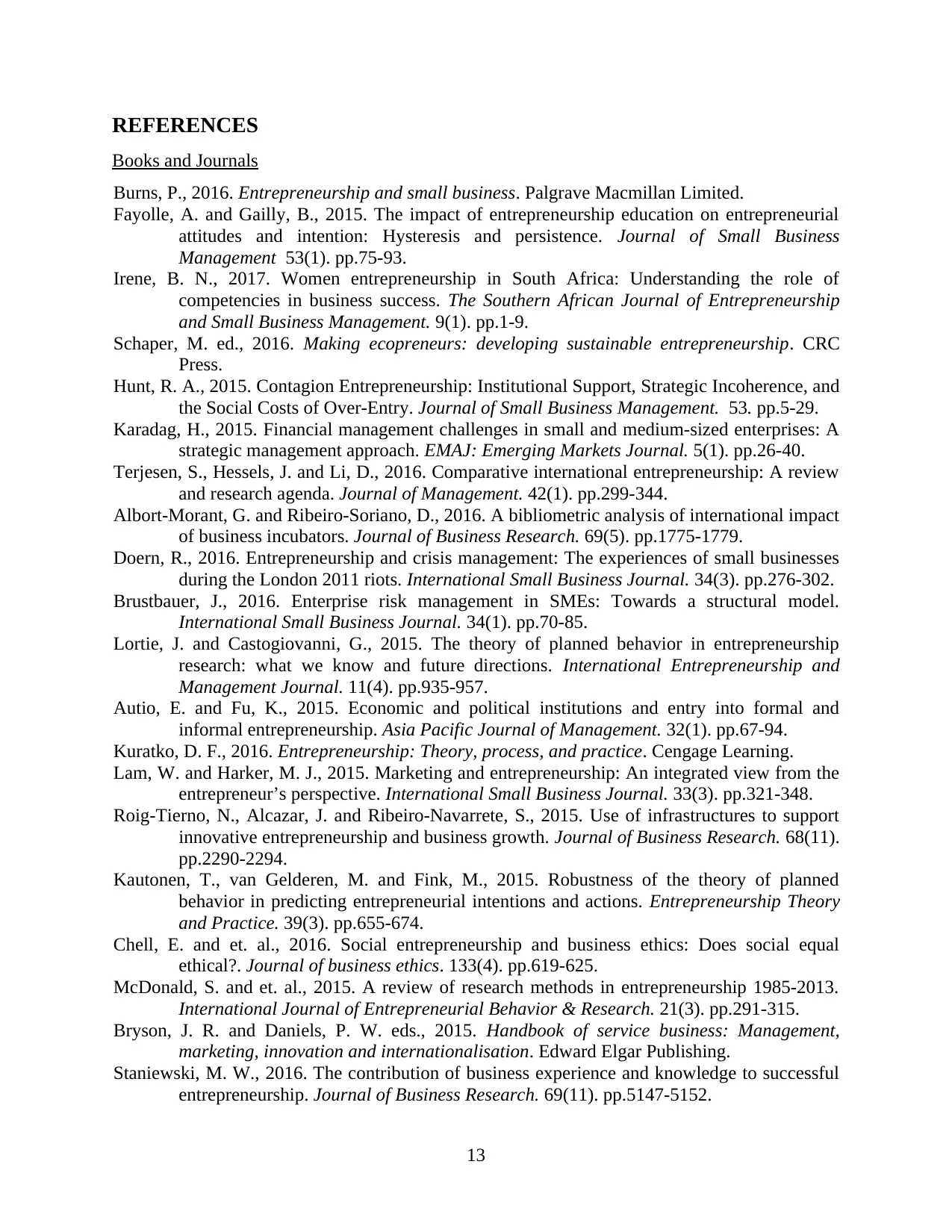
REFERENCES
Books and Journals
Burns, P., 2016. Entrepreneurship and small business. Palgrave Macmillan Limited.
Fayolle, A. and Gailly, B., 2015. The impact of entrepreneurship education on entrepreneurial
attitudes and intention: Hysteresis and persistence. Journal of Small Business
Management 53(1). pp.75-93.
Irene, B. N., 2017. Women entrepreneurship in South Africa: Understanding the role of
competencies in business success. The Southern African Journal of Entrepreneurship
and Small Business Management. 9(1). pp.1-9.
Schaper, M. ed., 2016. Making ecopreneurs: developing sustainable entrepreneurship. CRC
Press.
Hunt, R. A., 2015. Contagion Entrepreneurship: Institutional Support, Strategic Incoherence, and
the Social Costs of Over‐Entry. Journal of Small Business Management. 53. pp.5-29.
Karadag, H., 2015. Financial management challenges in small and medium-sized enterprises: A
strategic management approach. EMAJ: Emerging Markets Journal. 5(1). pp.26-40.
Terjesen, S., Hessels, J. and Li, D., 2016. Comparative international entrepreneurship: A review
and research agenda. Journal of Management. 42(1). pp.299-344.
Albort-Morant, G. and Ribeiro-Soriano, D., 2016. A bibliometric analysis of international impact
of business incubators. Journal of Business Research. 69(5). pp.1775-1779.
Doern, R., 2016. Entrepreneurship and crisis management: The experiences of small businesses
during the London 2011 riots. International Small Business Journal. 34(3). pp.276-302.
Brustbauer, J., 2016. Enterprise risk management in SMEs: Towards a structural model.
International Small Business Journal. 34(1). pp.70-85.
Lortie, J. and Castogiovanni, G., 2015. The theory of planned behavior in entrepreneurship
research: what we know and future directions. International Entrepreneurship and
Management Journal. 11(4). pp.935-957.
Autio, E. and Fu, K., 2015. Economic and political institutions and entry into formal and
informal entrepreneurship. Asia Pacific Journal of Management. 32(1). pp.67-94.
Kuratko, D. F., 2016. Entrepreneurship: Theory, process, and practice. Cengage Learning.
Lam, W. and Harker, M. J., 2015. Marketing and entrepreneurship: An integrated view from the
entrepreneur’s perspective. International Small Business Journal. 33(3). pp.321-348.
Roig-Tierno, N., Alcazar, J. and Ribeiro-Navarrete, S., 2015. Use of infrastructures to support
innovative entrepreneurship and business growth. Journal of Business Research. 68(11).
pp.2290-2294.
Kautonen, T., van Gelderen, M. and Fink, M., 2015. Robustness of the theory of planned
behavior in predicting entrepreneurial intentions and actions. Entrepreneurship Theory
and Practice. 39(3). pp.655-674.
Chell, E. and et. al., 2016. Social entrepreneurship and business ethics: Does social equal
ethical?. Journal of business ethics. 133(4). pp.619-625.
McDonald, S. and et. al., 2015. A review of research methods in entrepreneurship 1985-2013.
International Journal of Entrepreneurial Behavior & Research. 21(3). pp.291-315.
Bryson, J. R. and Daniels, P. W. eds., 2015. Handbook of service business: Management,
marketing, innovation and internationalisation. Edward Elgar Publishing.
Staniewski, M. W., 2016. The contribution of business experience and knowledge to successful
entrepreneurship. Journal of Business Research. 69(11). pp.5147-5152.
13
Books and Journals
Burns, P., 2016. Entrepreneurship and small business. Palgrave Macmillan Limited.
Fayolle, A. and Gailly, B., 2015. The impact of entrepreneurship education on entrepreneurial
attitudes and intention: Hysteresis and persistence. Journal of Small Business
Management 53(1). pp.75-93.
Irene, B. N., 2017. Women entrepreneurship in South Africa: Understanding the role of
competencies in business success. The Southern African Journal of Entrepreneurship
and Small Business Management. 9(1). pp.1-9.
Schaper, M. ed., 2016. Making ecopreneurs: developing sustainable entrepreneurship. CRC
Press.
Hunt, R. A., 2015. Contagion Entrepreneurship: Institutional Support, Strategic Incoherence, and
the Social Costs of Over‐Entry. Journal of Small Business Management. 53. pp.5-29.
Karadag, H., 2015. Financial management challenges in small and medium-sized enterprises: A
strategic management approach. EMAJ: Emerging Markets Journal. 5(1). pp.26-40.
Terjesen, S., Hessels, J. and Li, D., 2016. Comparative international entrepreneurship: A review
and research agenda. Journal of Management. 42(1). pp.299-344.
Albort-Morant, G. and Ribeiro-Soriano, D., 2016. A bibliometric analysis of international impact
of business incubators. Journal of Business Research. 69(5). pp.1775-1779.
Doern, R., 2016. Entrepreneurship and crisis management: The experiences of small businesses
during the London 2011 riots. International Small Business Journal. 34(3). pp.276-302.
Brustbauer, J., 2016. Enterprise risk management in SMEs: Towards a structural model.
International Small Business Journal. 34(1). pp.70-85.
Lortie, J. and Castogiovanni, G., 2015. The theory of planned behavior in entrepreneurship
research: what we know and future directions. International Entrepreneurship and
Management Journal. 11(4). pp.935-957.
Autio, E. and Fu, K., 2015. Economic and political institutions and entry into formal and
informal entrepreneurship. Asia Pacific Journal of Management. 32(1). pp.67-94.
Kuratko, D. F., 2016. Entrepreneurship: Theory, process, and practice. Cengage Learning.
Lam, W. and Harker, M. J., 2015. Marketing and entrepreneurship: An integrated view from the
entrepreneur’s perspective. International Small Business Journal. 33(3). pp.321-348.
Roig-Tierno, N., Alcazar, J. and Ribeiro-Navarrete, S., 2015. Use of infrastructures to support
innovative entrepreneurship and business growth. Journal of Business Research. 68(11).
pp.2290-2294.
Kautonen, T., van Gelderen, M. and Fink, M., 2015. Robustness of the theory of planned
behavior in predicting entrepreneurial intentions and actions. Entrepreneurship Theory
and Practice. 39(3). pp.655-674.
Chell, E. and et. al., 2016. Social entrepreneurship and business ethics: Does social equal
ethical?. Journal of business ethics. 133(4). pp.619-625.
McDonald, S. and et. al., 2015. A review of research methods in entrepreneurship 1985-2013.
International Journal of Entrepreneurial Behavior & Research. 21(3). pp.291-315.
Bryson, J. R. and Daniels, P. W. eds., 2015. Handbook of service business: Management,
marketing, innovation and internationalisation. Edward Elgar Publishing.
Staniewski, M. W., 2016. The contribution of business experience and knowledge to successful
entrepreneurship. Journal of Business Research. 69(11). pp.5147-5152.
13
Secure Best Marks with AI Grader
Need help grading? Try our AI Grader for instant feedback on your assignments.

Jaouen, A. and Lasch, F., 2015. A new typology of micro-firm owner-managers. International
Small Business Journal. 33(4). pp.397-421.
Online
Big Five personality test traits. 2018. [Online]. Available
through.<https://www.123test.com/big-five-personality-theory/>.
14
Small Business Journal. 33(4). pp.397-421.
Online
Big Five personality test traits. 2018. [Online]. Available
through.<https://www.123test.com/big-five-personality-theory/>.
14
1 out of 17
Related Documents
Your All-in-One AI-Powered Toolkit for Academic Success.
+13062052269
info@desklib.com
Available 24*7 on WhatsApp / Email
![[object Object]](/_next/static/media/star-bottom.7253800d.svg)
Unlock your academic potential
© 2024 | Zucol Services PVT LTD | All rights reserved.





